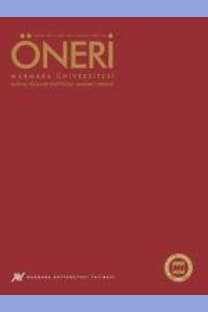MUHASEBENİN YOLSUZLUK AMAÇLI KÖTÜYE KULLANIMI: SONRASI BANKA İFLÂSLARINDA TÜRKİYE DENEYİMİ
Muhasebenin destekleyici (bilgi sağlayıcı)ve dağıtıcı işlevleri içsel ve yapısal özelliği (hâkim ekonomik düşüncenin bir uzantısı olması ve mevcût ekonomik altyapı temelinde faaliyet göstermesi) nedeniyle nesnel ve yansız biçimde yerine getirilememektedir. Nitekim muhasebeden çoğu zaman yönetimin kurmay- larından biri olarak belirlenen bir iş tanımı çerçevesinde hareket etmesi beklenmektedir. Bu yaklaşım muhasebeyi salt üretim, pazarlama, finans, insan kaynakları gibi üst yönetime bağlı olan ve özellikle yöne- timi karar alma sürecinde destekleyen yönetim işlevine indirgeme riskini taşımaktadır. Oysaki muhasebe finansal raporlama sürecinde ürettiği bilgilerle ekonomik olgu ve gerçeklikleri büyük ölçüde yeniden inşa etmektedir. Türkiye’de 2000’lerin başında 25 bankanın Tasarruf Mevduatı Sigorta Fonu (TMSF)’na devri ile sonuçlanan süreçte, muhasebenin yönetime bağımlı, tâbi, alt ve ikincil konumu kişilik ve özün önceliği gibi en temel muhasebe ilkelerinin dahi uygulanabilmesini engellemiş ve son tahlilde yönetim (üst yönetim ve yönetim kurulu) işlemlerini kayıtsız şartsız gerçekleştirdikten sonra bunları ekonomik amaçlarını yan- sıtmayacak ve yönetimi diğer tüm çıkar sahiplerinden daha çok himaye edecek biçimde şeklen kaydeden ya da hiç kaydetmeyen bir işleve dönüşmesine neden olmuştur. Bununla birlikte, tüm bu iflâsları yaratıcı bir muhasebe uygulaması olarak değil, bir yağmalama ve risk kaydırma faaliyeti olarak tanımlamak çok daha doğru ve makûl bir yargı olabilecektir; bu konunun en önemli noktasıdır, çünkü ilki temel olarak bir kurum ve uygulama olarak muhasebeyi suçlu görmekte, ikincisi ise politik ve ekonomik sistemi de içerecek biçimde bütün yönetimi bir bütün olarak sorumlu tutmaktadır.
Anahtar Kelimeler:
Muhasebe İşlevi; Muhasebe ve Banka Hileleri; Bankalarda Yağmalama ve Risk Öteleme
THE ABUSE OF ACCOUNTING FOR CORRUPTION: THE TURKISH EXPERIENCE OF BANK FAILURES IN THE POST-2000 PERIOD
Accounting’s supportive (informative) and allocative functions could not be performed in an objective and impartial manner due to its intrinsic and structural feature (i.e. its being an extension of the dominant economic thinking and operating on the grounds of the prevailing economic infrastructure). Thus, accounting is mostly expected to act within the framework of a job description defined simply as a management staff. This approach have a risk of reducing accounting to just a management function such as production, marketing, finance and human resources which subordinates and particularly supports the senior ma- nagement in its decision making process. Whereas, accounting largely reconstructs economic facts and realities with the information it produces in financial reporting process. Within the process concluding with the takeover of 25 banks by the Savings Deposits Insurance Fund (SDIF) of Turkey in the early 2000’s, accounting’s subservient, subordinate, secondary and dependent position has prevented it from practicing even the most fundamental accounting principles such as personality and substance over form and in the final analysis transformed it into a function which did not record at all or keep record of tran- sactions only with respect to its form in a way not reflecting their economic objectives and favoring the management more than all other stakeholders, and only after the management (senior management and board of directors) handles the transactions without any condition and reservation. However, it may be a much more precise and reasonable judgement to qualify all these bankruptcies as a kind of looting and risk shifting operation rather than a creative accounting practice, which is the most crucial point of the matter because the latter puts the blame essentially on accounting as an institution and profession while the former holds responsible the managementas a whole including the political and economic system.
Keywords:
The Accounting Function; Accounting and Banking Frauds; Looting and Risk Shifting in Banks,
- ISSN: 1300-0845
- Yayın Aralığı: Yılda 2 Sayı
- Başlangıç: 1994
- Yayıncı: Marmara Üniversitesi
Sayıdaki Diğer Makaleler
İŞLETMENİN SÜREKLİLİĞİ VARSAYIMININ DEĞERLENDİRİLMESİ: BORSA İSTANBUL (BİST) SINAÎ ENDEKSİ ÖRNEĞİ
Serkan TERZİ, Metin ATMACA, Begüm ÖKTEM
AĞIZDAN AĞIZA PAZARLAMANIN GÖSTERİŞÇİ TÜKETİM ÜZERİNE ETKİSİ
KÂR PAYI AVANSI DAĞITIMINDA VERGİSEL BOYUT VE MUHASEBELEŞTİRME: ÖRNEK UYGULAMA
Özgür ÇATIKKAŞ, Neşe ÇOBAN ÇELİKDEMİR, Ayhan YATBAZ
Ceyda AYSUNA TÜRKYILMAZ, Sibel AYDOĞAN, Sahavet GURDAL
GEÇMİŞE TANIKLIK EDEN BELGELERLE KADINA YÖNELİK ŞİDDET
ELLIOTT DALGA PRENSİBİ VE ALTIN PİYASASI ÜZERİNE BİR UYGULAMA
